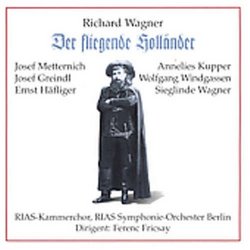| All Artists: Josef Metternich, Richard [Classical] Wagner, Ferenc Fricsay, RIAS Symphonie-Orchester, Annelies Kupper, Ernst Haefliger, Wolfgang Windgassen Title: Wagner: Der fliegende Holländer Members Wishing: 0 Total Copies: 0 Label: Preiser Records Release Date: 3/29/2005 Genre: Classical Styles: Opera & Classical Vocal, Historical Periods, Modern, 20th, & 21st Century Number of Discs: 2 SwapaCD Credits: 2 UPC: 717281200363 |
Search - Josef Metternich, Richard [Classical] Wagner, Ferenc Fricsay :: Wagner: Der fliegende Holländer
 | Josef Metternich, Richard [Classical] Wagner, Ferenc Fricsay Wagner: Der fliegende Holländer Genre: Classical |
Larger Image |
CD Details |
CD ReviewsOne of Best All-Round Dutchmen Alfred E. Krause | Chicago IL,, USA | 12/07/2006 (4 out of 5 stars) "Ratings of recordings of this work vary greatly, according to the expectations of the reviewer. I find the work difficult to listen to without a Senta who sounds both beautiful and passionate. Squally, sqeaky, shrill Sentas completely disable the drama. This tends to narrow my choices down to this recording, plus Studer/Sinopoli on DG, Voight/Levine on Sony, and possibly Varnay/Keilberth on Testament. I have not heard, but have heard good things about Stemme/Parry on Chandos.
A second major variable is the Dutchman himself. In this respect there are two major divisions: (a) half-demonic Dutchmen out of Edgar Allen Poe, exemplified by George London, and (b) world weary Dutchmen, exemplified by almost everyone else, including Metternich/Fricsay, Hotter/Reiner and Schmidt Isserstedt, Crass/Sawallisch, Uhde/Keilberth and Morris/Levine on the first team. London/Dorati,even if not in his best voice, suggests that centuries of torment have seeped into the Dutchman's soul and he is becoming ossified into some kind of monster himself; the resemblance to Marschner's Hans Heiling is pronounced. Metternich is a strong Dutchman, but not in this class. A third major variable is the conductor and orchestra. Here Fricsay (followed closely by Bohm) is probably the standard for a fiery, passionate performance, but can truly alienate some, as in the review above. Levine is probably the standard for a slow monumental realization, but will alienate just as many. Klemperer, with a generally inadequate cast, will show you hundreds of wonderful things in the orchestra not to be heard anywhere else. One more variable is quality of recorded sound. This is good to excellent (and stereo)on the cumulatively good recordings of Levine/Sony and Keilberth/Testament. It is fair to good (mono)on this recording, depending on its various (re)incarnations: dreadfully bass-shy on a DG two-fer and somewhat better on Aura; I have not heard this issue, but Preiser usually has very high quality transfers. Other variables may be interesting, but not decisive. Riddersuch and Ek for Bohm are the best Daland/Steersman team. Wunderlich for Kopnwitschny is the best individual steersman. Domingo/Sinopoli, Seiffert/Barenboim, Lewis/Dorati, Schock/Konwitschny and Windgassen here are good to excellent Eriks. There is one accidental or deliberate cut to be heard on all versions of this recording: the second verse of the (Act III) sailors' chorus. Was this a result of damaged tape or was it present on the original 1952 DG/Decca? Finally, I have heard many good things about the London/Rysanek/Sawallisch off-the-air performance from Bayreuth 1959, when both parties were said to be in excellent voice, but the Bayreuth recordings from that time I have heard (including a remarkable Lohengrin) have a very poorly defined sound. " |
